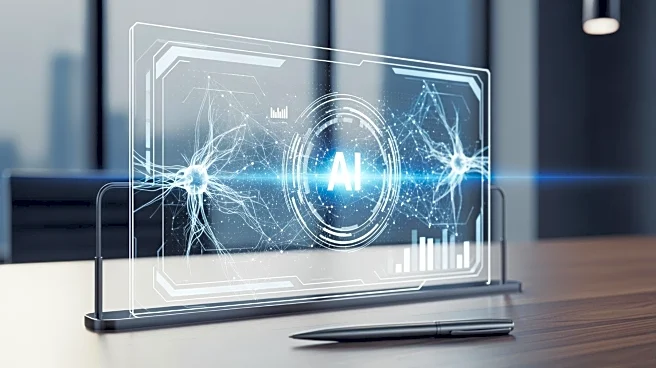What's Happening?
Meta, the social media giant, announced that starting in 2026, it will assess employees based on their 'AI-driven impact.' This initiative, detailed in an internal memo by Janelle Gale, Meta's head of
people, aims to integrate AI usage into the core expectations for employee performance. While AI usage metrics will not be part of the 2025 performance reviews, employees are encouraged to highlight their AI achievements in self-reviews. This move is part of a broader trend in corporate America, where companies like Microsoft, Google, and Amazon are pushing for increased AI adoption among employees. Meta has already implemented changes such as allowing AI use in coding interviews and launching an internal game to promote AI engagement.
Why It's Important?
The decision by Meta to tie employee performance to AI impact reflects a significant shift towards an AI-centric corporate culture. This move could influence other companies to adopt similar practices, potentially transforming workplace dynamics and expectations. By prioritizing AI-driven results, Meta aims to enhance productivity and innovation, which could lead to competitive advantages in the tech industry. Employees who effectively leverage AI may find new opportunities for career advancement, while those who struggle with AI integration might face challenges. This shift underscores the growing importance of AI skills in the modern workforce.
What's Next?
As Meta implements this new performance evaluation system, employees will likely need to adapt to increased AI usage in their daily tasks. The company plans to roll out an 'AI Performance Assistant' to aid in writing performance reviews, starting December 8. This tool, along with Meta's internal AI assistant Metamate and Google's Gemini, will support employees in crafting performance content. The broader implications may include changes in hiring practices, training programs, and employee incentives, as Meta seeks to foster an AI-native future.
Beyond the Headlines
The integration of AI into employee performance metrics raises ethical and cultural questions about the role of technology in the workplace. It challenges traditional notions of productivity and may lead to debates about privacy, data usage, and the potential for AI to replace human judgment. As companies increasingly rely on AI, there may be a need for new policies and regulations to address these concerns and ensure fair and transparent practices.










